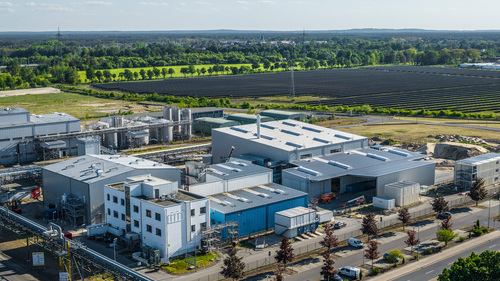BASF starts commercial operation of Black Mass plant for Battery Recycling in Schwarzheide, Germany
BASF has successfully started the commercial operation of its Black Mass plant in Schwarzheide, Germany. This state-of-the-art facility represents a significant milestone for BASF’s battery recycling business. It is one of the biggest commercial Black Mass plants in Europe, with an annual processing capacity of up to 15,000 tons of end-of-life lithium-ion batteries and production scrap. This equals roughly 40,000 electric vehicle batteries per year.
The successful start of the commercial operation of this plant therefore marks an important step for the European battery industry. Battery recycling is a key factor in increasing independence from primary raw material sources and meeting the ambitious requirements of circular economy policies. Black mass production is a key step in the battery recycling process and is based on mechanical treatment of the batteries. The Black Mass contains high amounts of key metals used to produce cathode active materials (CAM): lithium, nickel, cobalt, and manganese. These valuable metals can be chemically recovered and used to produce new CAM, enabling circularity and reducing the carbon footprint compared to using only primary raw materials.
“Our new Black Mass plant is another proof for our commitment to the Battery Materials and Recycling industry, which remains to be one of the most significant growth opportunities in the chemical industry and for BASF Battery Materials. It will become a cornerstone of our offerings to our customers to increase raw materials self-sufficiency and comply with the EU Battery Regulation,” said Dr. Daniel Schönfelder, President of BASF’s Battery Materials division. “With the new Black Mass plant, we strengthen our position as the preferred battery recycling partner for customers along the entire battery recycling value chain in Europe.”
BASF’s offering in Europe covers all steps along the battery recycling value chain, from collecting end-of-life batteries and production scrap, discharging and dismantling, as well as Black Mass production and refining – leveraging a strong and reliable partner network in addition to BASF’s own Black Mass production facility. In addition to the new Black Mass production, BASF also operates in Schwarzheide Europe’s first fully automated CAM production, a prototype metal refinery for battery recycling, and one of Europe’s largest Black Mass storage facilities.
About BASF Battery Materials
BASF’s Battery Materials business is a global leader in advanced cathode active materials (CAM) for lithium-ion batteries. We empower the world’s leading cell manufacturers and OEM platforms with high-performance solutions tailored to their needs. Our portfolio includes base metals sourcing and, management, as well as various battery recycling solutions. By leveraging our industry-leading R&D platforms and passion for innovation, we develop unique, proprietary solutions that drive customer success and support the transition towards electromobility.
Our global production and R&D footprint across key regions ensure a reliable supply of high-quality materials and localized support for our partners. This allows us to better serve our customers worldwide. For more information, visit
Latest news
Hycamite’s technology to decarbonize shipping awarded AiP by industry leader DNV
Kokkola Industrial Park →Hycamite’s proprietary Thermo-Catalytic Decomposition (TCD) technology offers a new approach to producing clean hydrogen by breaking down methane, the primary component of liquefied natural gas (LN...
Clariant catalysts will power the Ecoplanta: Europe's first waste-to-methanol plant
Chemmed Cluster Tarragona →Repsol is building Europe’s first plant to produce renewable methanol from urban waste The facility will use Enerkem gasification technology to produce 240 KTA of methanol Clariant will supply cata...
Lilly plans to build a new $3 billion facility to boost oral medicine manufacturing capacity in Europe for patients worldwide
Netherlands site will bring 500 manufacturing and 1,500 construction jobs while further strengthening Lilly's global supply chain
Ports of Duisburg and Rotterdam advance energy transition together
Port of Rotterdam →With this LoI, the two major European logistics hubs reinforce their goal of jointly developing sustainable transport corridors via waterways as well as future-oriented initiatives for the energy t...

